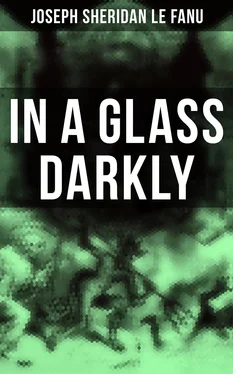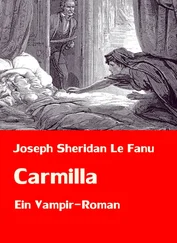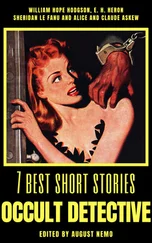“Say, then, my dear sir,” urged he, “say how you would have me serve you — what you would learn of me — what I can do or say to relieve you?”
“Listen to me first,” replied Captain Barton; with a subdued air, and an effort to suppress his excitement, “listen to me while I detail the circumstances of the persecution under which my life has become all but intolerable — a persecution which has made me fear death and the world beyond the grave as much as I have grown to hate existence.”
Barton then proceeded to relate the circumstances which I have already detailed, and then continued:
“This has now become habitual — an accustomed thing. I do not mean the actual seeing him in the flesh — thank God, that at least is not permitted daily. Thank God, from the ineffable horrors of that visitation I have been mercifully allowed intervals of repose, though none of security; but from the consciousness that a malignant spirit is following and watching me wherever I go, I have never, for a single instant, a temporary respite. I am pursued with blasphemies, cries of despair, and appalling hatred. I hear those dreadful sounds called after me as I turn the corners of the streets; they come in the night-time, while I sit in my chamber alone; they haunt me everywhere, charging me with hideous crimes, and — great God! — threatening me with coming vengeance and eternal misery. Hush! do you hear that ?” he cried, with a horrible smile of triumph; “there — there, will that convince you?”
The clergyman felt a chill of horror steal over him, while, during the wail of a sudden gust of wind, he heard, or fancied he heard, the half-articulate sounds of rage and derision mingling in the sough.
“Well, what do you think of that ?” at length Barton cried, drawing a long breath through his teeth.
“I heard the wind,” said Doctor ——. “What should I think of it — what is there remarkable about it?”
“The prince of the powers of the air,” muttered Barton, with a shudder.
“Tut, tut! my dear sir,” said the student, with an effort to reassure himself; for though it was broad daylight there was nevertheless something disagreeably contagious in the nervous excitement under which his visitor so miserably suffered. “You must not give way to these wild fancies; you must resist these impulses of the imagination.”
“Ay, ay; ‘resist the devil and he will flee from thee,’” said Barton, in the same tone; “but how resist him? ay, there it is — there is the rub. What — what am I to do? what can I do?”
“My dear sir, this is fancy,” said the man of folios; “you are your own tormentor.”
“No, no, sir — fancy has no part in it,” answered Barton, somewhat sternly. “Fancy! was it that made you , as well as me, hear, but this moment, those accents of hell? Fancy, indeed! No, no.”
“But you have seen this person frequently,” said the ecclesiastic; “why have you not accosted or secured him? Is it not a little precipitate, to say no more, to assume, as you have done, the existence of preternatural agency; when, after all, everything may be easily accountable, if only proper means were taken to sift the matter.”
“There are circumstances connected with this — this appearance ,” said Barton, “which it is needless to disclose, but which to me are proofs of its horrible nature. I know that the being that follows me is not human — I say I know this; I could prove it to your own conviction.” He paused for a minute, and then added, “And as to accosting it, I dare not, I could not; when I see it I am powerless; I stand in the gaze of death, in the triumphant presence of infernal power and malignity. My strength, and faculties, and memory, all forsake me. O God, I fear, sir, you know not what you speak of. Mercy, mercy; heaven have pity on me!”
He leaned his elbow on the table, and passed his hand across his eyes, as if to exclude some image of horror, muttering the last words of the sentence he had just concluded again and again.
“Doctor — — ” he said, abruptly raising himself, and looking full upon the clergyman with an imploring eye, “I know you will do for me whatever may be done. You know now fully the circumstances and the nature of my affliction. I tell you I cannot help myself; I cannot hope to escape; I am utterly passive. I conjure you, then, to weigh my case well, and if anything may be done for me by vicarious supplication — by the intercession of the good — or by any aid or influence whatsoever, I implore of you, I adjure you in the name of the Most High, give me the benefit of that influence — deliver me from the body of this death. Strive for me, pity me; I know you will; you cannot refuse this; it is the purpose and object of my visit. Send me away with some hope — however little — some faint hope of ultimate deliverance, and I will nerve myself to endure, from hour to hour, the hideous dream into which my existence has been transformed.”
Doctor assured him that all he could do was to pray earnestly for him, and that so much he would not fail to do. They parted with a hurried and melancholy valediction. Barton hastened to the carriage that awaited him at the door, drew down the blinds, and drove away, while Doctor returned to his chamber, to ruminate at leisure upon the strange interview which had just interrupted his studies.
Table of Contents
IT was not to be expected that Captain Barton’s changed and eccentric habits should long escape remark and discussion. Various were the theories suggested to account for it. Some attributed the alteration to the pressure of secret pecuniary embarrassments; others to a repugnance to fulfil an engagement into which he was presumed to have too precipitately entered; and others, again, to the supposed incipiency of mental disease, which latter, indeed, was the most plausible, as well as the most generally received, of the hypotheses circulated in the gossip of the day.
From the very commencement of this change, at first so gradual in its advances, Miss Montague had of course been aware of it. The intimacy involved in their peculiar relation, as well as the near interest which it inspired, afforded, in her case, a like opportunity and motive for the successful exercise of that keen and penetrating observation peculiar to her sex.
His visits became, at length, so interrupted, and his manner, while they lasted, so abstracted, strange, and agitated, that Lady L— — after hinting her anxiety and her suspicions more than once, at length distinctly stated her anxiety, and pressed for an explanation.
The explanation was given, and although its nature at first relieved the worst solicitudes of the old lady and her niece, yet the circumstances which attended it, and the really dreadful consequences which it obviously indicated, as regarded the spirits, and indeed the reason of the now wretched man who made the strange declaration, were enough, upon little reflection, to fill their minds with perturbation and alarm.
General Montague, the young lady’s father, at length arrived. He had himself slightly known Barton some ten or twelve years previously and, being aware of his fortune and connexions, was disposed to regard him as an unexceptionable and indeed a most desirable match for his daughter. He laughed at the story of Barton’s supernatural visitations, and lost no time in calling upon his intended son-in-law.
“My dear Barton,” he continued, gaily, after a little conversation, “my sister tells me that you are a victim to blue devils, in quite a new and original shape.”
Barton changed countenance, and sighed profoundly.
Читать дальше












